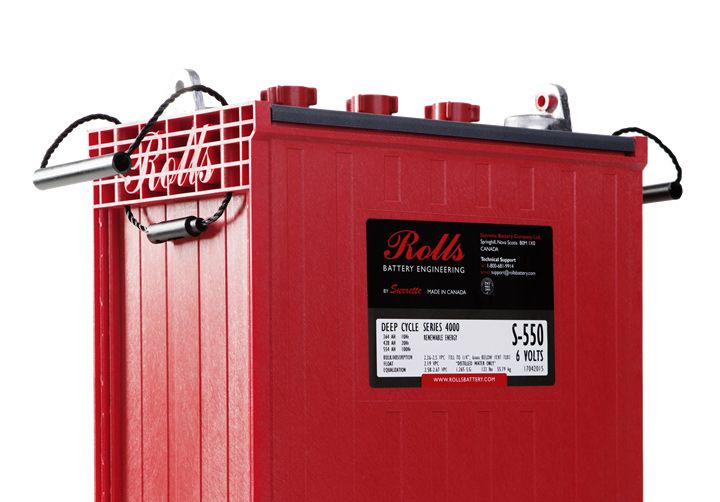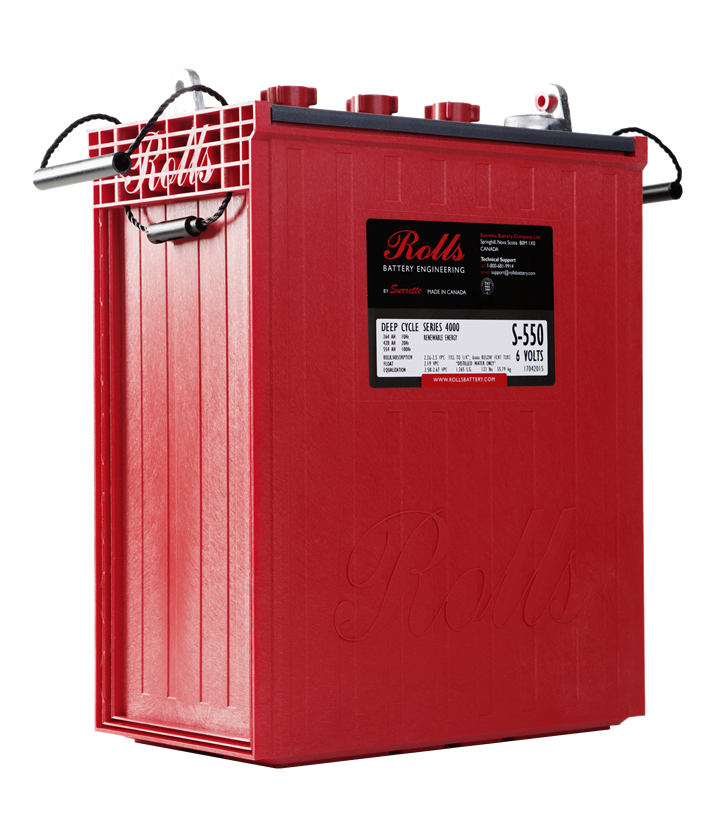Lead acid batteries are built in 2-volt cell configurations and are offered in a wide range of capacity & voltage options to meet the needs of a specific install. Lead acid battery banks are scalable to meet small to large-capacity storage needs.
 Lead-Acid Batteries for Solar Storage
Lead-Acid Batteries for Solar Storage

Jeff Myles | Rolls Battery Engineering
Tell us a little bit about Rolls Battery and the history of the company.
Surrette Battery Company Ltd. is one of North America’s leading lead-acid battery producers and Canada’s only remaining independent battery manufacturer. As the exclusive manufacturer of Rolls-branded deep cycle batteries, we have been manufacturing at our facility in Springhill, Nova Scotia since 1959. We offer a full range of premium quality traditional Flooded and sealed AGM & GEL VRLA models used in Renewable Energy, Marine, Motive Power and Railroad applications.

Why do lead acid batteries continue to be the most popular for use in battery-based off-grid & backup systems?
The main reason: cost/kWh for lead-acid remains the most economical for residential battery-based systems. Flooded lead-acid batteries offer the most economical solution when balancing cost, capacity & product cycle life. AGM & GEL VRLA options are also available to offer solutions where a sealed maintenance-free product may be required.
What makes lead-acid batteries an easy choice for solar installers?
Lead acid batteries are built in 2-volt cell configurations and are offered in a wide range of capacity & voltage options to meet the needs of a specific install. Lead acid battery banks are scalable to meet small to large-capacity storage needs. Many of the models chosen for renewable energy applications serve multi-purpose and are also used in a variety of other applications. As a result, they are readily available through most battery distributors & dealers.
Aside from cost, are there any risks or considerations which drive the decision to choose lead acid over other battery technologies?
When properly installed, the use of lead-acid batteries in residential applications does not pose the same risks of fire & explosion associated with many of the lithium products currently entering the market. Those risks also have the potential to drive up installation code requirements and any associated insurance costs with choosing a higher risk energy storage solution. Charging lead-acid batteries is also far less complicated, omitting the need for more expensive and complex battery monitoring systems used in lithium cell charging.
How do lead acid batteries compare with respect to overall product life?
Product cycle life is always a consideration when selecting a battery. Lead-acid batteries have been used for many decades and are backed by a proven track record offering reliable, long-term energy storage utilizing a relatively simple technology. Ultimately, when properly maintained, lead-acid batteries offer users many years of use at a lower price point when compared to a newer higher-cost alternative technology with cycle life expectations that have yet to be proven.
From an environmental perspective, where do lead acid batteries stand?
Lead acid batteries are an excellent choice for those seeking a "green" environmentally-friendly product. It's interesting to note that lead-acid batteries are the most recyclable consumer product. From lead components to battery cases, nearly every component of the product is recycable. Lead acid batteries are also the most recycled consumer product in the U.S. at a whopping 99%. - more than aluminium cans and plastics. Currently, recycling of lithium products is extremely complex, costly and limited. Unfortunately, as a result of these factors, the majority of lithium battery products end up in our landfills when cells fail and/or the product reaches end of life.
Obviously there are far more options for energy storage available now, how has that affected your business and what is the company doing to continue to thrive and grow?
We have seen a number of new battery technologies emerge into the market in recent years, specifically in lithium-based technologies. These products are well-suited to applications where weight or size may be a constraint, however they are far more costly than a traditional lead acid alternative. Looking specifically at the Renewable Energy industry, we continue to see a steady increase in demand for our flooded and sealed models worldwide as they provide the most cost-effective energy storage solution for most stationary applications. To maintain growth, our focus has been in working closely with our customers and adapting and tailoring our product offering to meet their specific needs. As a small company, we've been able to respond to these requests quickly and efficiently.
The content & opinions in this article are the author’s and do not necessarily represent the views of AltEnergyMag
Comments (0)
This post does not have any comments. Be the first to leave a comment below.
Featured Product

